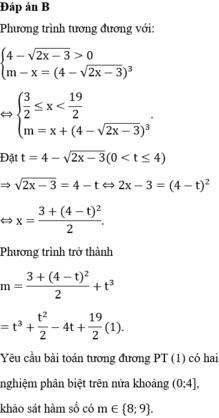Biết phương trình có hai nghiệm là và tỉ số trong đó và a, b có ước chung lớn nhất bằng 1. Tính
Hãy nhập câu hỏi của bạn vào đây, nếu là tài khoản VIP, bạn sẽ được ưu tiên trả lời.

tham khảo
a)Điều kiện \(3-x>0\) hay \(x< 3\)
\(4-log\left(3-x\right)=3log\left(3-x\right)=1\Leftrightarrow10^1=3-x\)
Vậy nghiệm của phương trình là \(x=2\) thỏa mãn điều kiện
b) Điều kiện \(x+2>0\) và \(x-1>0\) tức là \(x>1\)
\(\left(x+2\right)\left(x-1\right)=2\Rightarrow x^2+x-4=0\)
Vậy pt có nghiệm \(x=\dfrac{-1+\sqrt{17}}{2}\)

\(a,\left(0,3\right)^{x-3}=1\\ \Leftrightarrow x-3=0\\ \Leftrightarrow x=3\\ b,5^{3x-2}=25\\ \Leftrightarrow3x-2=2\\ \Leftrightarrow3x=4\\ \Leftrightarrow x=\dfrac{4}{3}\\ c,9^{x-2}=243^{x+1}\\ \Leftrightarrow3^{2x-4}=3^{5x+5}\\ \Leftrightarrow2x-4=5x+5\\ \Leftrightarrow3x=-9\\ \Leftrightarrow x=-3\)
d, Điều kiện: \(x>-1;x\ne0\)
\(log_{\dfrac{1}{x}}\left(x+1\right)=-3\\ \Leftrightarrow x+1=x^3\\ x\simeq1,325\left(tm\right)\)
e, Điều kiện: \(x>\dfrac{5}{3}\)
\(log_5\left(3x-5\right)=log_5\left(2x+1\right)\\ \Leftrightarrow3x-5=2x+1\\ \Leftrightarrow x=6\left(tm\right)\)
f, Điều kiện: \(x>\dfrac{1}{2}\)
\(log_{\dfrac{1}{7}}\left(x+9\right)=log_{\dfrac{1}{7}}\left(2x-1\right)\\ \Leftrightarrow x+9=2x-1\\ \Leftrightarrow x=10\left(tm\right)\)

a) \({3^{{x^2} - 4x + 5}} = 9 \Leftrightarrow {x^2} - 4x + 5 = 2 \Leftrightarrow {x^2} - 4x + 3 = 0 \Leftrightarrow \left( {x - 3} \right)\left( {x - 1} \right) = 0\)
\( \Leftrightarrow \left[ \begin{array}{l}x = 3\\x = 1\end{array} \right.\)
Vậy phương trình có nghiệm là \(x \in \left\{ {1;3} \right\}\)
b) \(0,{5^{2x - 4}} = 4 \Leftrightarrow 2x - 4 = {\log _{0,5}}4 \Leftrightarrow 2x = 2 \Leftrightarrow x = 1\)
Vậy phương trình có nghiệm là x = 1
c) \({\log _3}(2x - 1) = 3\) ĐK: \(2x - 1 > 0 \Leftrightarrow x > \frac{1}{2}\)
\( \Leftrightarrow 2x - 1 = 27 \Leftrightarrow x = 14\) (TMĐK)
Vậy phương trình có nghiệm là x = 14
d) \(\log x + \log (x - 3) = 1\) ĐK: \(x - 3 > 0 \Leftrightarrow x > 3\)
\(\begin{array}{l} \Leftrightarrow \log \left( {x.\left( {x - 3} \right)} \right) = 1\\ \Leftrightarrow {x^2} - 3x = 10\\ \Leftrightarrow {x^2} - 3x - 10 = 0\\ \Leftrightarrow \left( {x + 2} \right)\left( {x - 5} \right) = 0\\ \Leftrightarrow \left[ \begin{array}{l}x = - 2 (loại) \,\,\,\\x = 5 (TMĐK) \,\,\,\,\,\,\,\end{array} \right.\end{array}\)
Vậy phương trình có nghiệm x = 5

Điều kiện x > 1. Khi đó phương trình tương đương với

Loại nghiệm x = -1 do không thỏa mãn điều kiện. Phương trình có một nghiệm x = 3.
Chọn đáp án B.

a)
ĐK: \(\left\{{}\begin{matrix}2x-4>0\\x-1>0\end{matrix}\right.\Leftrightarrow x>1\)
\(\log_5\left(2x-4\right)+\log_{\dfrac{1}{5}}\left(x-1\right)=0\\ \Leftrightarrow\log_5\left(2x-4\right)-\log_5\left(x-1\right)=0\\ \Leftrightarrow\log_5\left(\dfrac{2x-4}{x-1}\right)=\log_51\\ \Leftrightarrow\dfrac{2x-4}{x-1}=1\\ \Leftrightarrow2x-4=x-1\\ \Leftrightarrow x=3\left(tm\right)\)
Vậy x = 3.
b) ĐK: x > 0
\(\log_2x+\log_4x=3\\ \Leftrightarrow\log_2x+\dfrac{1}{2}\log_2x=3\\ \Leftrightarrow\left(1+\dfrac{1}{2}\right)\log_2x=3\\ \Leftrightarrow\dfrac{3}{2}\log_2x=3\\ \Leftrightarrow\log_2x=2\\ \Leftrightarrow x=4\left(tm\right)\)
Vậy x= 4



\(a,3^x>\dfrac{1}{243}\\ \Leftrightarrow3^x>3^{-5}\\ \Leftrightarrow x>-5\\ b,\left(\dfrac{2}{3}\right)^{3x-7}\le\dfrac{3}{2}\\ \Leftrightarrow3x-7\le1\\ \Leftrightarrow3x\le8\\ \Leftrightarrow x\le\dfrac{8}{3}\\ c,4^{x+3}\ge32^x\\ \Leftrightarrow2^{2x+6}\ge2^{5x}\\ \Leftrightarrow2x+6\ge5x\\ \Leftrightarrow3x\le6\\ \Leftrightarrow x\le2\)
d, Điều kiện: x > 1
\(log\left(x-1\right)< 0\\ \Leftrightarrow x-1< 1\\ \Leftrightarrow1< x< 2\)
e, Điều kiện: \(x>\dfrac{1}{2}\)
\(log_{\dfrac{1}{5}}\left(2x-1\right)\ge log_{\dfrac{1}{5}}\left(x+3\right)\\ \Leftrightarrow2x-1\ge x+3\\ \Leftrightarrow x\ge4\)
f, Điều kiện: x > 4
\(ln\left(x+3\right)\ge ln\left(2x-8\right)\\ \Leftrightarrow x+3\ge2x-8\\\Leftrightarrow4< x\le11\)

a) \({\log _{\frac{1}{7}}}\left( {x + 1} \right) > {\log _7}\left( {2 - x} \right)\) (ĐK: \(x + 1 > 0;2 - x > 0 \Leftrightarrow - 1 < x < 2\))
\(\begin{array}{l} \Leftrightarrow {\log _{{7^{ - 1}}}}\left( {x + 1} \right) > {\log _7}\left( {2 - x} \right)\\ \Leftrightarrow - {\log _7}\left( {x + 1} \right) > {\log _7}\left( {2 - x} \right)\\ \Leftrightarrow {\log _7}{\left( {x + 1} \right)^{ - 1}} > {\log _7}\left( {2 - x} \right)\\ \Leftrightarrow {\left( {x + 1} \right)^{ - 1}} > 2 - x\\ \Leftrightarrow \frac{1}{{x + 1}} - 2 + x > 0\\ \Leftrightarrow \frac{{1 + \left( {x - 2} \right)\left( {x + 1} \right)}}{{x + 1}} > 0\\ \Leftrightarrow \frac{{1 + {x^2} - x - 2}}{{x + 1}} > 0 \Leftrightarrow \frac{{{x^2} - x - 1}}{{x + 1}} > 0\end{array}\)
Mà – 1 < x < 2 nên x + 1 > 0
\( \Leftrightarrow {x^2} - x - 1 > 0 \Leftrightarrow \left[ \begin{array}{l}x < \frac{{1 - \sqrt 5 }}{2}\\x > \frac{{1 + \sqrt 5 }}{2}\end{array} \right.\)
KHĐK ta có \(\left[ \begin{array}{l} - 1 < x < \frac{{1 - \sqrt 5 }}{2}\\\frac{{1 + \sqrt 5 }}{2} < x < 2\end{array} \right.\)
b) \(2\log \left( {2x + 1} \right) > 3\) (ĐK: \(2x + 1 > 0 \Leftrightarrow x > \frac{{ - 1}}{2}\))
\(\begin{array}{l} \Leftrightarrow \log \left( {2x + 1} \right) > \frac{3}{2}\\ \Leftrightarrow 2x + 1 > {10^{\frac{3}{2}}} = 10\sqrt {10} \\ \Leftrightarrow x > \frac{{10\sqrt {10} - 1}}{2}\end{array}\)
KHĐK ta có \(x > \frac{{10\sqrt {10} - 1}}{2}\)

Đáp án D